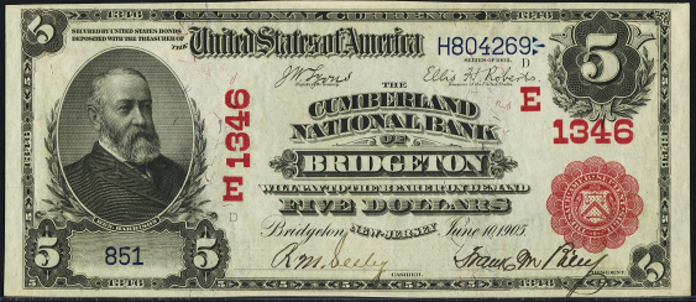Five Dollar Notes › Nationals › 1902 Five Dollar National Bank Notes › Maryland Charters › 1902 $5 Silver Spring Maryland Silver Spring National Bank
Get Value Now
| Item | Info |
|---|---|
| Series | 1902 |
| Charter | #9830 Silver Spring National Bank of Silver Spring, Maryland |
| Year Chartered | 1910, 291 Banks Chartered |
| City Info | Silver Spring is an unincorporated community and census-designated place in Montgomery County, Maryland, United States. It had a population of 76,716 according to 2013 estimates by the United States Census Bureau, making it the fourth most populous place in Maryland, after Baltimore, Columbia, and Germantown. Silver Spring consists of the following communities; Downtown Silver Spring, East Silver Spring, Woodside, Woodside Park, Forest Glen, North Hills Sligo Park, Franklin Knolls, Indian Spring Terrace, Indian Spring Village, Four Corners, Burnt Mills, Sunset Terrace, Northwood Park, Clifton Park Village, New Hampshire Estates, Oakview, Hillandale, White Oak, Calverton, Westfarm, Colesville, Colesville Park, Cloverly, Fairland, Briggs Chaney, Greencastle, and Kemp Mill. Source: Wikipedia |
| Similar Cities | If your note doesn't match try: 1. Silver Springs, New York - Silver Springs National Bank |
| Seal Varieties | Red, Blue |
| See Also | If your note doesn't match try: 1. 1907 $5 Legal Tender 2. 1899 $5 Silver Certificates |
| Other Info | 1. Value depends on notes known for charter, condition and market demand. |
| Neat Fact | 1-5 Digit Charter number critical to note identification. It is Red, Blue, Black or rarely absent altogehter. It is printed over the note design. |
No Obligations Offers and Appraisals
Please submit a good photo or scan. It will be identified and evaluated. Understand there may be subtle differences between the image you see above and your note. Signatures, design, markings and note condition will determine the offer price. Notes in Uncirculated or better condition receive the best offers.
Appraisals can be estimated for wholesale and retail prices. Wholesale is what dealers typically pay. Retail is what a collector might pay. Retail is slightly higher in most cases.
Please visit this page for USA Paper Money Reference. Do not treat this page as a reference guide, it is for appraisal and acquisition purposes only.
